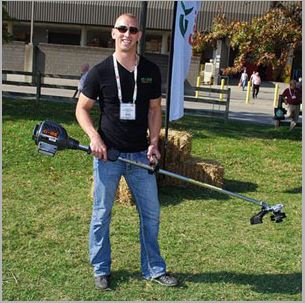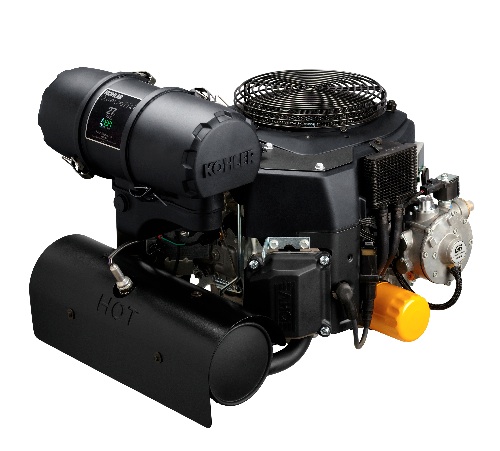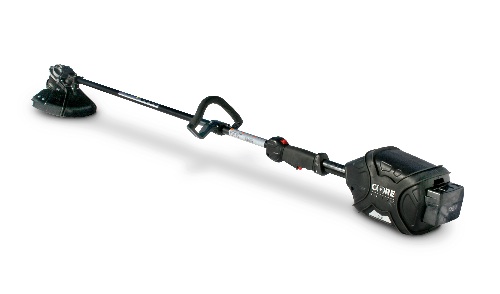With increasingly efficient technology and demand driving introductions, major manufacturers like STIHL, Kohler and CORE Outdoor Power have begun manufacturing innovative environmentally friendly or “green” outdoor power equipment. Some manufacturers are making gasoline engines more fuel-efficient and offering propane-fueled versions, while others are creating battery-powered outdoor power equipment with comparable performance to gasoline models.
Why go green now? Some say it’s all about the significant innovations in engine and battery technology. Lincoln Jore, president of CORE Outdoor Power, says, “There has been a need for real innovation for many years now. Until now, it’s been the same stuff repackaged over and over. Maybe the batteries were a little bit better, but there was no serious innovation like we’re seeing today.”
As battery technology progresses, manufacturers are incorporating the technology into their outdoor power equipment.

Lincoln Jore, president of CORE Outdoor Power, cites advances in technology and a need for further innovation as the reasons for the increasing popularity of battery-powered equipment.
Daniel Pherson, product manager for STIHL Inc., agrees. “It’s no secret that battery-powered equipment has been on the market for a long time, but 10 years ago the technology wasn’t there to make it powerful enough to be efficient for commercial landscapers,” he says. “In recent years, with the leaps in cell phones and other battery-powered devices, battery technology has become very good.”
With longer run times, more power and ease of use, battery-powered equipment is now able to compete with their gasoline-powered counterparts, making them a feasible and worthwhile investment for commercial landscapers and homeowners.
New Technology Saves Money
Kohler’s green technology investments have been in electronic fuel injection (EFI) systems for its engines, which improve fuel efficiency and reduced emissions compared to traditional carbureted engines.

William Schnell, product manager for Kohler, says Kohler has the goal of being a net zero emissions producer and a net zero landfill-waste producer by 2035.
The company has also started incorporating that technology using alternative fuels like propane and E85. “Our gasoline engines with EFI technology achieve a 25% fuel savings, which equates to about $1 per hour savings over our carbureted engines. When you combine the advantages of EFI with the added cost savings and environmental benefits of propane, you get a greener engine that won’t sacrifice performance,” says William Schnell, product manager for Kohler.
Pherson of STIHL says these cost savings are especially attractive to landscapers. “Professional landscapers have been looking into and buying battery-powered equipment for a few years now. Not just because they want to go green, but because it can be more economical in the long run. You save a lot on fuel, and they are lightweight and easy to start.
“With an AR 900 backpack battery, STIHL’s hedge trimmers can run up to 11 hours. With gas powered equipment, you usually have to go back to the truck to refuel every 40-50 minutes,” Pherson says. “The cost of operating one of our hedge trimmers is 2 cents per hour compared to the $1 per hour required to operate a gas hedge trimmer. That’s a dramatic difference that allows commercial landscapers to break even in 300 hours, or about a half year of work.”

STIHL’s Product Manager, Daniel Pherson, says that many places like hospitals and universities all like green outdoor power equipment, both for environmental and economical reasons.
Each of STIHL’s lithium-ion products features the “Caring for Nature” logo, identifying them as environmentally responsible. The seal signifies that the products produce zero or low exhaust emissions.
STIHL offers high-performing, battery-powered chain saws, trimmers, blowers, hedge trimmers and lawn mowers, but also includes an array of low-exhaust emission gasoline models. At the 2013 GIE+EXPO, STIHL introduced its lithium-ion backpack battery, the AR 900. At the same time, the company also introduced its environmentally conscious, gas-powered FS240R and S240 trimmers, which are more fuel-efficient than previous models.
CORE, the self-named “gas-less” company boasts “intelligent technology to replace gas.” It recently launched its new Elite trimmer and blower. Both are battery-powered, solely dedicated to commercial landscapers and are the company’s most powerful battery-powered equipment to date. The Elite line offers double the torque as previous models, with increased efficiency, more power and longer run times.
“Our Elite line uses the same motor technology that we’ve used in our other motor designs, but we’ve upgraded everything so it has a lot more power and much longer run times,” says Jore.
Sustainability Driving Technology
With the draws of increased fuel efficiency and improved battery technology, manufacturers are seeing an increasing demand for greener outdoor power equipment, both from commercial landscapers and homeowners. The manufacturers say they are committed to steadily improving technology and investing in green options to further stimulate demand.

Kohler’s EFI engines achieve a 25% fuel savings over carbureted engines.
Schnell says, “We’ve seen a strong market response since we released our EFI propane engines last year and I believe we will continue to see growth in that product going forward. It’s taking off in the marketplace and many of our recent product launches have revolved around our EFI technology.
“We embrace environmental sustainability as a key pathway to success, innovation and long-term leadership in all our markets. From a company perspective, we have the goal of being a net zero emissions producer and a net zero landfill-waste producer by 2035. Beyond technology, we have a corporate mission to be more sustainable and environmentally friendly,” he says.
Schnell expects that all of Kohler’s engines will eventually incorporate EFI technology and the industry as a whole will continue moving in the direction of lower-emission producing and fuel-saving equipment and technology.
Educating Consumers
For battery-powered equipment, Jore says it isn’t always easy convincing customers of its effectiveness. “We’re trying to drive the movement toward electric. There’s a stigma in the industry toward electric, specifically in the commercial landscaper segment of the industry because historically, battery-powered products have been underpowered, cheap and just haven’t lasted. Getting over that stigma has been a difficult, expensive and timely process.”
CORE has about 1,800 dealers nationwide for its electric equipment and Jore says he is seeing an increasing number of lawn care specialists who market themselves as green using electric outdoor power equipment. (Read the profile of Ecological Lawn & Tree Care in the summer 2013 issue of Rural Lifestyle Dealer.)
Pherson of STIHL says, “Gasoline-powered (gas) equipment still sells better today. Many commercial landscapers are just more comfortable at this point buying gas equipment, but the STIHL Lithium-Ion powered equipment can be a better solution for some. We continue to see growth in green, battery-powered outdoor power equipment and I expect that this segment of the industry is going to continue to grow.

STIHL’s hedge trimmers can run up to 11 hours with an AR 900 backpack battery.
“The best dealers we have selling our lithium-ion equipment are successful because they look around their area and see who is trying to go green,” Pherson says. “Many places like colleges and hospitals are concerned with reducing their carbon footprint, but they also like how much quieter and more economical our battery-powered tools are. There are also many homeowners who look for our battery-powered equipment because it is easy to start and run and has a lightweight and maneuverable design.”
Opportunities for Dealers
STIHL, Kohler and CORE continue to look for ways to improve the performance of all of their equipment, including making their equipment more sustainable. As they invest in green technology, all three manufacturers recommend that dealers also begin investing in this growing segment of the industry as well. They say to learn the technology now, because a time will come when all outdoor power equipment is considered green.





Post a comment
Report Abusive Comment